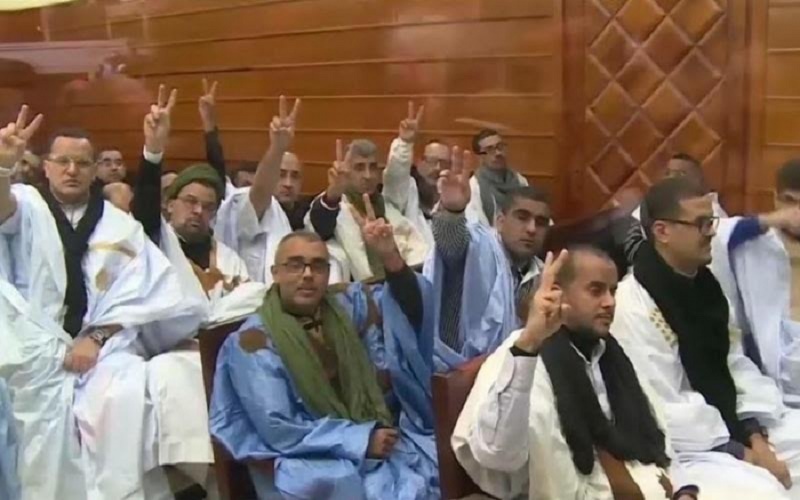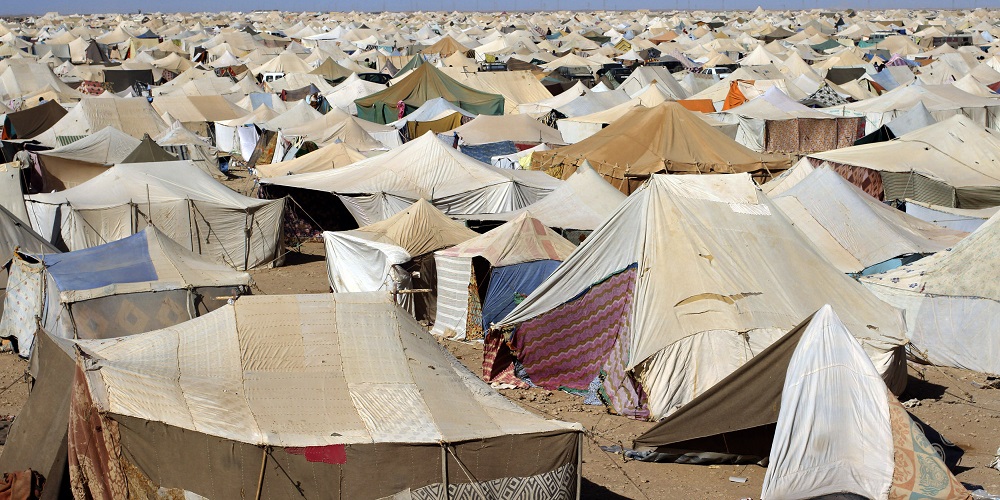Omar Bahia Abdelmajid est né et a grandi à Tan-Tan en 1967, une ville où il a assisté aux premières manifestations organisées par le Front Polisario. Issu d’une famille connue pour son engagement indéfectible dans la lutte pour l’indépendance du Sahara Occidental, Omar a été imprégné, dès son plus jeune âge, par le combat pour la liberté. Sa famille a payé un lourd tribut pour cette cause : son oncle maternel, Salam Hussain Hnia, a été arrêté en 1987 alors qu’il tentait de rejoindre les camps de réfugiés sahraouis. Il fut décédé dans un centre de détention secret à El Ayoun, sous le régime d’occupation marocain.
Militant déterminé, Omar Abdelmajid manifestait fréquemment son soutien au Front Polisario en scandant des slogans en faveur de la cause sahraouie, notamment devant le commissariat d’Es-Skeikima. Ce dimanche, le 3 novembre, les colons marocains se rassemblaient dans la place Michouar, dans le cadre des festivités commémorant la Marche Verte dont l’anniversaire était proche. Omar les a affrontés et a protesté contre l’occupant et en faveur du Front Polisario. Là il fut arrêté. Des témoins affirment qu’il a été battu, puis transféré au poste de police.
Le lendemain, lundi, il a été présenté au procureur avant d’être envoyé à la prison locale d’El Ayoun. Une fois dans la prison, avant même d’être jugé, la police l’a soumis à des actes de torture qui lui ont coûté la vie.
Le mercredi, son corps avait été transféré à l’hôpital. Omar avait été amené déjà mort, sans aucun document officiel attestant les circonstances de son décès.
Son corps a été envoyé à Agadir pour procéder à son autopsie, mais les résultats n’ont pas été délivrés à la famille. La famille a été ignorée et contrainte de garder silence.
De nombreux Sahraouis sont accourus à son enterrement, le dimanche 10. Omar éprouvait un énorme respect pour les héros décédés dans des prisons secrètes aux mains de l’occupant marocain. Maintenant c’est à nous de l’honorer.
EQUIPE MEDIA
Lundi 11 Novembre 2024
El Ayoun. Sahara Occidental occupé
https://emsahara.com/?page_id=724&lang=fr2024/11/12
Omar Bahia Abdelmajid was born and raised in Tan-Tan in 1967, a city where he attended the first demonstrations organized by the Polisario Front. Coming from a family known for its unwavering commitment to the struggle for the independence of Western Sahara, Omar was imbued, from a very young age, with the fight for freedom. His family paid a heavy price for this cause: his maternal uncle, Salam Hussain Hnia, was arrested in 1987 when he tried to join the Sahrawi refugee camps. He died in a secret detention center in El Aaiun, under the Moroccan occupation regime.
A determined activist, Omar Abdelmajid frequently demonstrated his support for the Polisario Front by chanting slogans in favour of the Sahrawi cause, especially in front of the Es-Skeikima police station. That Sunday, November 3, Moroccan settlers gathered in Michouar Square, as part of the festivities commemorating the Green March, the anniversary of which was approaching. Omar confronted them and protested against the occupier and in favor of the Polisario Front. There he was arrested. Witnesses claim that he was beaten and then transferred to the police station.
The next day, Monday, he was presented to the prosecutor before being sent to the local prison in El Aaiun. Once in prison, even before being judged, the police subjected him to acts of torture that cost him his life.
On Wednesday, his corpse had been transferred to the hospital. Omar had already been brought in dead, without any official document attesting to the circumstances of his death.
His body was sent to Agadir for an autopsy, but the results were not given to the family. The family was ignored and forced to remain silent.
Many Sahrawis came to his funeral on Sunday, the 10th. Omar had a huge respect for the heroes who died in secret prisons at the hands of the Moroccan occupier. Now it is up to us to honour him.
EQUIPE MEDIA
Monday, Novembre 11, 2024
El Aaiun, occupied Western Sahara
https://emsahara.com/?p=2553&lang=en
Omar Bahia Abdelmajid, asesinado en una cárcel marroquí
2024/11/12
Omar Bahia Abdelmajid nació y creció en Tan-Tan en 1967, una ciudad donde asistió a las primeras manifestaciones organizadas por el Frente Polisario. Proveniente de una familia conocida por su inquebrantable compromiso con la lucha por la independencia del Sáhara Occidental, Omar fue imbuido, desde muy joven, de la lucha por la libertad. Su familia pagó un alto precio por esta causa: su tío materno, Salam Hussain Hnia, fue arrestado en 1987 cuando intentaba unirse a los campamentos de refugiados saharauis. Falleció en un centro de detención secreto en El Aaiún, bajo el régimen de ocupación marroquí.
Militante convencido, Omar Abdelmajid manifestaba frecuentemente su apoyo al Frente Polisario coreando consignas a favor de la causa saharaui, especialmente frente a la comisaría de Es-Skeikima. Este domingo, el 3 de noviembre, los colonos marroquíes se reunieron en la plaza Michouar, en el marco de las festividades que conmemoraban la Marcha Verde, cuyo aniversario estaba próximo. Omar se enfrentó a ellos y protestó contra el ocupante y a favor del Frente Polisario. Ahí fue arrestado. Testigos afirman que fue golpeado y luego trasladado a la comisaría de policía.
Al día siguiente, lunes, fue presentado ante el fiscal antes de ser enviado a la prisión local de El Aaiún. Una vez en la prisión, incluso antes de ser juzgado, la policía lo sometió a torturas que le costaron la vida.
El miércoles, su cuerpo había sido trasladado al hospital. Omar había sido llevado ya muerto, sin ningún documento oficial que acreditara las circunstancias de su fallecimiento.
Su cuerpo fue enviado a Agadir para realizarle una autopsia, pero los resultados no fueron entregados a la familia. La familia fue ignorada y obligada a guardar silencio.
Muchos saharauis acudieron a su entierro, el domingo 10. Omar sentía un enorme respeto por los héroes fallecidos en prisiones secretas a manos del ocupante marroquí. Ahora nos toca a nosotros honrarlo.
EQUIPE MEDIA
Lunes 11 de Noviembre de 2024
El Aaiún. Sahara Occidental ocupado
https://emsahara.com/?p=2567&lang=es








